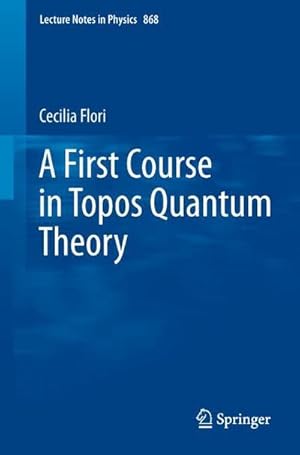flori cecilia (2 Ergebnisse)
Produktart
- Alle Produktarten
- Bücher (2)
- Magazine & Zeitschriften
- Comics
- Noten
- Kunst, Grafik & Poster
- Fotografien
- Karten
-
Manuskripte &
Papierantiquitäten
Zustand
- Alle
- Neu
- Antiquarisch/Gebraucht
Einband
- alle Einbände
- Hardcover
- Softcover
Weitere Eigenschaften
- Erstausgabe
- Signiert
- Schutzumschlag
- Angebotsfoto
Land des Verkäufers
Verkäuferbewertung
-
A Second Course in Topos Quantum Theory
Verlag: Springer International Publishing, 2018
ISBN 10: 3319711075ISBN 13: 9783319711072
Anbieter: AHA-BUCH GmbH, Einbeck, Deutschland
Buch
Taschenbuch. Zustand: Neu. Druck auf Anfrage Neuware - Printed after ordering - This advanced course, a sequel to the first volume of this lecture series on topos quantum theory, delves deeper into the theory, addressing further technical aspects and recent advances. These include, but are not limited to, the development of physical quantities and self-adjoint operators; insights into the quantization process; the description of an alternative, covariant version of topos quantum theory; and last but not least, the development of a new concept of spacetime. The book builds on the concepts introduced in the first volume (published as Lect. Notes Phys. 868), which presents the main building blocks of the theory and how it could provide solutions to interpretational problems in quantum theory, such as: What are the main conceptual issues in quantum theory And how can these issues be solved within a new theoretical framework of quantum theory These two volumes together provide a complete, basic course on topos quantum theory, offering a set of mathematical tools to readers interested in tackling fundamental issues in quantum theory in general, and in quantum gravity in particular. From the reviews ofthe first volume: The book is self-contained and can be used as a textbook or self-study manual teaching the usage of category theory and topostheory, in particular in theoretical physics or in investigating the foundations of quantum theory in mathematically rigorous terms. [The] book is a very welcome contribution.Frank Antonsen, Mathematical Reviews, December, 2013.
-
A First Course in Topos Quantum Theory
Verlag: Springer Berlin Heidelberg, 2013
ISBN 10: 3642357121ISBN 13: 9783642357121
Anbieter: AHA-BUCH GmbH, Einbeck, Deutschland
Buch
Taschenbuch. Zustand: Neu. Druck auf Anfrage Neuware - Printed after ordering - In the last five decades various attempts to formulate theories of quantum gravity have been made, but none has fully succeeded in becoming the quantum theory of gravity. One possible explanation for this failure might be the unresolved fundamental issues in quantum theory as it stands now. Indeed, most approaches to quantum gravity adopt standard quantum theory as their starting point, with the hope that the theory's unresolved issues will get solved along the way. However, these fundamental issues may need to be solved before attempting to define a quantum theory of gravity. The present text adopts this point of view, addressing the following basic questions: What are the main conceptual issues in quantum theory How can these issues be solved within a new theoretical framework of quantum theory A possible way to overcome critical issues in present-day quantum physics - such as a priori assumptions about space and time that are not compatible with a theory of quantum gravity, and the impossibility of talking about systems without reference to an external observer - is through a reformulation of quantum theory in terms of a different mathematical framework called topos theory. This course-tested primer sets out to explain to graduate students and newcomers to the field alike, the reasons for choosing topos theory to resolve the above-mentioned issues and how it brings quantum physics back to looking more like a 'neo-realist' classical physics theory again.



